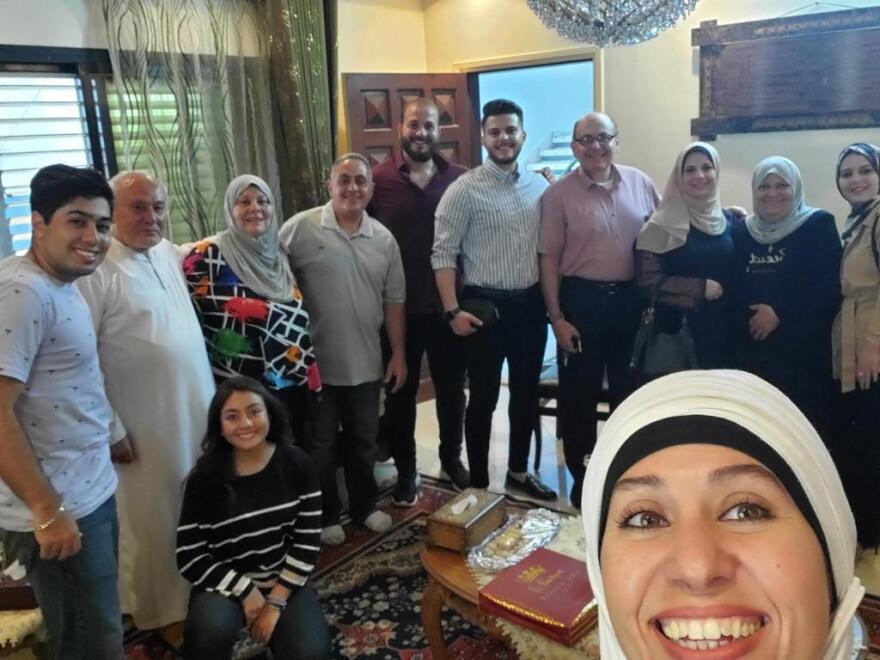Asil Elashy is a San Antonio Palestinian-American whose family lives in the Gaza Strip. She spoke with TPR in early November about how her family was doing under the then-month-long Israeli aerial and ground campaign that had already killed 13,000 people in response to the Oct. 7 Hamas attack that killed 1,100 people in Israel.
At the time Elashy spoke to TPR, she said she was trying to get her mother and brother out of Gaza through the Rafah border with Egypt, but that the major sticking point was that it didn’t seem like her brother’s wife and children would be allowed to cross into Egypt with him. He wouldn’t leave them behind, and Elashy’s mother was too frail to go alone.
“When it comes to them, when it comes to just like [the] last minute, you just wanna save them,” Elashy had said. “And saving them for me is just if I can get them outside Gaza, crossing the border.”
When TPR spoke with Elashy on the day after Christmas, she said she had good news.
“They were able to get out,” she said. “They left [the] Gaza Strip to Egypt. It was a lot of struggle of course as they were leaving. They stayed I guess a couple of weeks in Egypt, and then my mom and my brother were able to get here, so, they’re here, in my home.”
Elashy said she had been filled with joy and relief when she heard they had been able to cross into Egypt.
But she said everything had nearly fallen apart when her family reached the Egyptian border. Officials considered her mother and brother one-degree relatives, so they were allowed to cross. But her brother’s wife and children were not, so they were initially denied entry, which led Elashy’s brother to try to return to Gaza, his mother following behind him.
“When they found them all going to return, the Egyptian government said, 'We will let the wife and the kids come in’ under their responsibility,' ” she said.
They are now in Cairo, separated both from Elashy’s brother in the U.S. and the Israeli bombs in Gaza.
Elashy said she was overjoyed to get to spend the Christmas holiday with her mother and brother, who now have visas to stay in the U.S. for an entire year. Her sisters came from Los Angeles and Saudi Arabia to visit too.
But it’s emotionally complicated. Despite the reunion, she said her family’s feelings flit back and forth between joy, sorrow, and guilt.
“It’s very mixed feeling,” Elashy said. “Like we’re happy and then we’re watching the news, and it’s a very bad thing to watch the news and to see all of these pictures and see all of these videos. And then we’re laughing again and then we’re crying, and then laughing and then crying.”

She said her mother is constantly watching the news coming out of Gaza as Israel’s aerial and ground campaign continues.
“She's been still crying, still worrying, and still kind of like looking behind, you know what I'm saying?” she said. “Trying to call her two grandsons that she left in Egypt. And it's not a complete happiness. I would say it's a happiness, but it's incomplete happiness.”
Elashy said her happiness is incomplete too.
Because of U.S. immigration law, she was only able to help one-degree relatives like her mom and brother. Dozens of her extended family members remain in Gaza, and Elashy has not heard from many of them in weeks or longer.
“I feel guilty sometimes when I feel so happy,” she said. “I feel like I’m betraying so many kids by being happy and them not being happy. I feel sometimes I’m selfish. I got my mom and my brother out, but I could not save the rest of the family.”
She said a ceasefire is necessary, and she urged the San Antonio City Council to do everything in its power to push for one, including supporting a resolution “calling for an immediate and permanent ceasefire and return of all hostages immediately,” scheduled for a vote on Jan. 11.
“Who would not vote to stop bombing?” Elashy asked. “Who would not vote to stop killing kids?”
The Israeli military has killed more than 21,000 people in less than three months in Gaza as it pursues its stated goal of eliminating Hamas; the United Nations and the Gaza Health Ministry have said thousands of the dead are children.
The U.S. and Israel have continued to resist calls for a long-term ceasefire, claiming it would only help Hamas.




